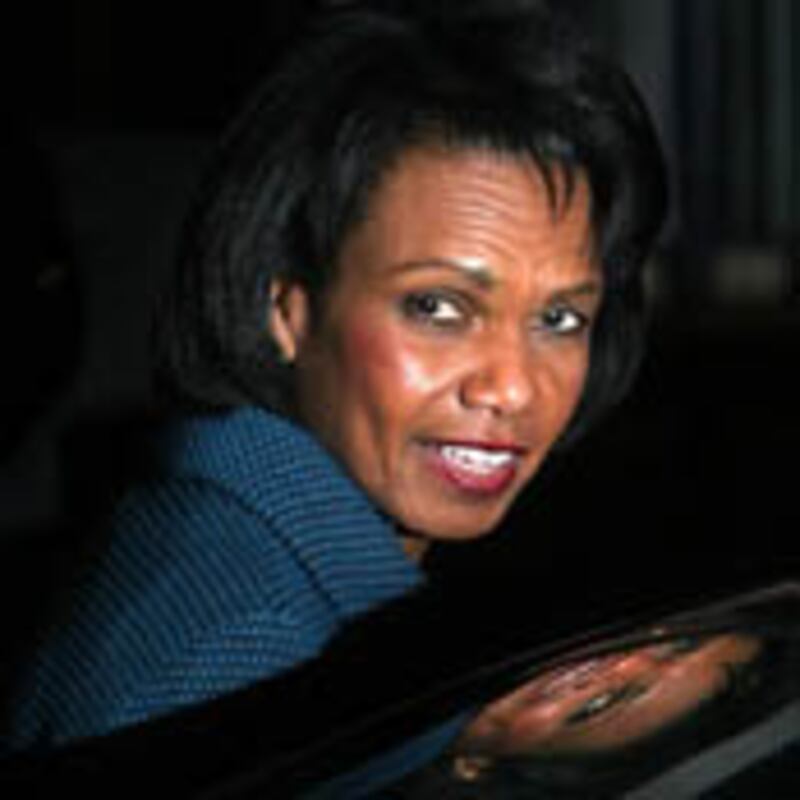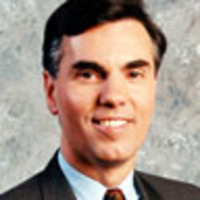
Last night outgoing Secretary of State Condoleezza Rice hosted her successor, Hillary Clinton, for a private dinner of mushroom soup, sea bass, and wild rice in her apartment at the Watergate. Is there a more high-octane meeting in recent memory that any policy wonk would have rather attended? Washington’s two most powerful women, history-makers both, with little reason at this point to hold back, exhuming the past eight years—and predicting the next. Though we’ll never know exactly what words passed between them, today Rice spoke with CBS News correspondent and Daily Beast contributor Dan Raviv. She talked about her relationship with the woman who will soon have her job, her personal excitement about Barack Obama’s election, and why she’s now leaving Washington to go back to “where I belong.”
“We shouldn't deceive ourselves that we've overcome everything about race. And the particular witch's brew that is race and poverty is still very, very hard.”
Q: How is Hillary Clinton going to do as Secretary?
A: She'll be great. She is somebody of great intelligence. She is somebody who really loves this country, who speaks forcefully and well for American interests and values.
Q: Are you personally excited about Barack Obama becoming our next President and our first African-American President?
A: Sure, it's meaningful. It's meaningful to me personally. It's meaningful to the country. I'm a kid from Birmingham, Alabama, and until we moved to Denver, Colorado, when I was 12 I didn't have a white classmate—the whole time when I went to school in Alabama. So sure! This is a huge move forward for our country. Our country has been getting there. You know, we've had back-to-back African-American Secretaries of State! We have heads of Fortune 500 companies who are black. The world's greatest golfer—not exactly a sport known for African-American dominance—is an African-American. And so, slowly but surely this country has been overcoming race.
I want to make a point, though: we're still not race-blind. We shouldn't deceive ourselves that we've overcome everything about race. And the particular witch's brew that is race and poverty is still very, very hard. And unless we improve our ability to provide a quality education for underprivileged kids, we're not going to really overcome in a massive way our past.
Q: May I take it that you actually preferred a victory for Senator Obama, and not John McCain?
A: I have constantly told people that I was Secretary of State and I was not going to get into a partisan debate. And I would vote my ballot in a secret way, as all Americans do. But I just want to acknowledge that after the election took place, it was a special time for Americans.
Q: When you leave this job, Madame Secretary, what's your plan? Where are you going?
A: I'm going west of the Mississippi, where I belong. I'll go back to Stanford. I'm on leave from Stanford!
Q: Did they hold your job?
A: Well, George Schultz was on leave for 12 years! I've been on leave for only eight. I'll go back. I plan to do some writing. I want to write, obviously, about foreign policy. I want to write a book about my parents, who were educational evangelists. I want to do work on something I worked on a lot before I came here, which is excellence in K-12 education.
You know, as Secretary of State, I've been privileged to represent this great country, and I know its strengths, and I know its challenges. One of its strengths is the belief—here and abroad —that this is a place where you get ahead on merit. It doesn't matter where you came from; it matters where you're going. It's the Log Cabin myth: modest circumstances, great achievements.
But I worry that the weakness—particularly of our public schools—is going to make that less and less true for everybody. And if we ever lose that as our core, then we're going to lose our confidence. We're not going to lead. We're going to protect. We're going to turn inward. That would be very bad for the world. So as a former Secretary of State, I think I can advocate for education as a national security priority.
Q: Do you want to give us a peek into your memoirs and tell us which leaders you've enjoyed dealing with, and which you really didn't look forward to?
A: Oh, I think I'd better wait until after I'm Secretary of State. ( Laughs) I really don't know who I may need to call! No, it's been a great experience. It's been hard at times. For those of us who were in positions of authority on September 11th, every day since has been September 12th. I would like to be able, if nothing else, to vivify for the American people the dramatic change that that event made.
It would be wrong to say that America had a kind of innocence before September 11th. But it wouldn't be wrong to say that we had a kind of complacency about what the great oceans protected us from—having not had an attack on our soil really since the 19th century. That changed a lot—changed the way we viewed foreign policy, the way we viewed failing states—that the greatest threats came from failed states, not from powerful nations. I'll hope to have a chance to vivify that and try to talk about how we tried to deal with the threats and also try to capitalize on the opportunities.
Dan Raviv is the author of books including Every Spy a Prince and host of a radio magazine show, the CBS News Weekend Roundup. CBS's Charles Wolfson also interviewed Rice.






